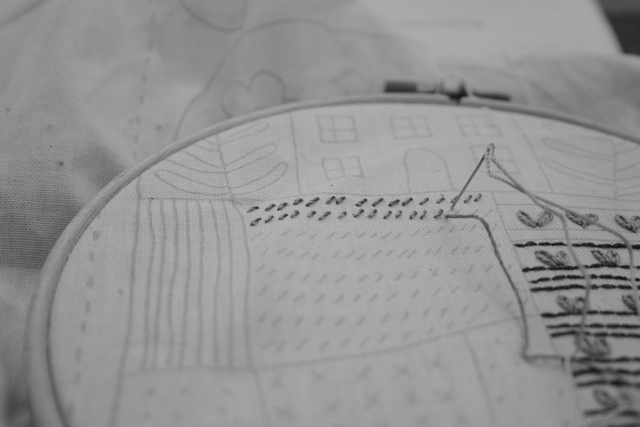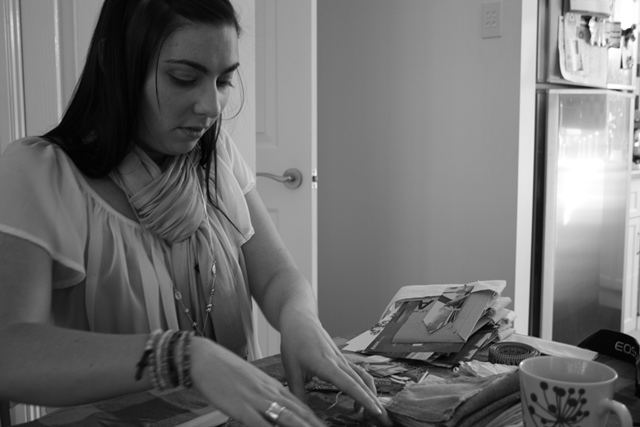Your deep gladness, His great purpose

This God we worship is a creative God, and He made us creatively, with a profusion of passions that can serve to add to His fame among the nations. Frederick Buechner said it vividly when he wrote that ‘the place God calls you to is where your deep gladness and the world’s deep hunger meet’ (Wishful Thinking, Frederick Buechner, p. 57). The truth in that thought makes the back of my neck prickle. It makes such absolute sense: the God Who fashioned the world in its immaculate artistry and diversity, setting the inscrutable physics of the universe in motion, is indeed capable of planting within us the deep gladness that meet the very needs of this world’s deep hunger.
For some of us, that deep gladness has been an inextricable part of our very selves from an early age. When I was seven, I wrote in my first journal that one day I’d be a famous writer and people would read my diary and marvel at my life. My ego was soaked in seven-year-old optimism, but I knew then and there that I cared about words and stories. For others of us, though, passions grow more slowly. As our minds and bodies develop into adulthood, so too do the things we care about. We realise we are good at something, that we want to be better, that when our hearts or our hands are immersed in this topic, the world might be spinning twice as fast for all we’d notice. Yet others of us aren’t so sure. There are things that we’re into, stuff that piques our interest, but maybe it’d be going too far to call any of it a passion. What then?
First of all, I think: relax. God is intensely creative. He is the Creator, the source and beginning of all creative endeavour, the Author of our uniqueness and our individuality. Second, ask yourself a few questions. What did you love in childhood that you wish you had time for now? What makes your heart skip a beat? What stirs your sense of injustice? What do you daydream about? How would yo
What, then, when we do know what we love? How do we take that passion and find a purpose in it?
I have pondered this question honestly and painfully for years. As a teenager, I could see and recognise distinctive passions that had a clear and right purpose. I could understand how praying for persecuted believers had a direct repercussion for the gospel. I recognised that writing to younger sisters in Christ had a power to brighten their days and encourage them in the faith. I could see that working with my family was a very direct outworking of Christ’s own passion for love in action. But I also loved paint. I loved making things with paper. I had a stash of found objects that I itched to play with and build into collages. I liked forming pictures from fabric, needle, and thread. I got excited when a story yanked me somewhere else entirely and took me soaring off into worlds of words. This stuff made me happy.
That was precisely the problem, though. Happiness does not equal service, and I wrestled long and hard with the idea that I could be absolutely delighted by things which seemed to bear no relationship to God or the gospel. It was a many-years-long battle. I consumed books by Christian artists, trying to get to the heart of this idea – that there were others like me who could happily spend time immersed in worlds of creation which seemed to have no eternal repercussions. I strove to understand the idea of doing these things ‘to the glory of God’, and wondered if that meant I must weave a gospel message into my quilts, paint only art that says something concrete about God, or inscribe Soli Deo Gloria onto all my work (not a bad idea, though; Bach did it). Ultimately, I was looking for the purpose behind my passions.

Eugene Peterson takes that beloved passage from the beginning of Romans 12 and paraphrases it in a way that points so clearly to our passions:
‘So here’s what I want you to do, God helping you: Take your everyday, ordinary life – your sleeping, eating, going-to-work, and walking-around life – and place it before God as an offering. Embracing what God does for you is the best thing you can do for him. Don’t become so well-adjusted to your culture that you fit into it without even thinking. Instead, fix your attention on God.’
(The Message, Eugene Peterson, Rom. 12)
It doesn’t need to hurt for it to be worship. God made us to embrace certain aspects of our humanity, and to revel in them. It might be the creation of an artwork, hiking to the top of a mountain, training a horse to respond to bit and bridle, baking rainbow cupcakes, or playing Rachmaninoff exquisitely. The fact that those things fill us with desperate joy can turn our hearts God-ward and make them into acts of worship, prayers to the God who passionately created us to feel passion. What is more, we glorify Him when we pursue those passions with excellence. We cannot worship Him shoddily, so let us not be slap-dash in our pursuit of passions.
One final caveat: the excellent pursuit of passions will often call for sacrifice. To do anything well requires time and energy and persistence and dedication. We will have to say no to good things in order to say yes to better things. But family is not one of the things we should sacrifice. Church is not one of those things. Faith is not one of those things. We cannot worship God with our earthly passions when we are neglecting the eternal things he has surrounded us with. Yes, you might need to send your little brother off to play outside so that you can make a deadline. But don’t ignore him. Don’t let him grow up without you being there. His soul is more precious than any novel or painting or show-jumping ribbon. The best God-ward-pursued passions are ones that keep things firmly in perspective. God first. People next. Then all the other stuff.
May purpose undergird our passions always. And may our deep gladness faithfully press forward to meet our world’s deep hunger – whether that hunger is for food, for relationship, for redemption, or for beauty.

Wow! Doubie Wow!!!! This just so nailed down so many thoughts for me. Thank you for sharing.
GREAT post. I love how well you describe what worship truly is. I think our culture sometimes takes it too far by associating it with only music. It is true that our passions are what praise God and i am glad you reminded me of this today. 🙂
Brilliant.
Thank you for voicing these things with such delicate clarity and helping me see things more like God does, every day.
Wow, thank you so much for sharing this! It helped me a lot…
To put things in perspective and understanding. Thank you so much.
In Christ,
Amy K.